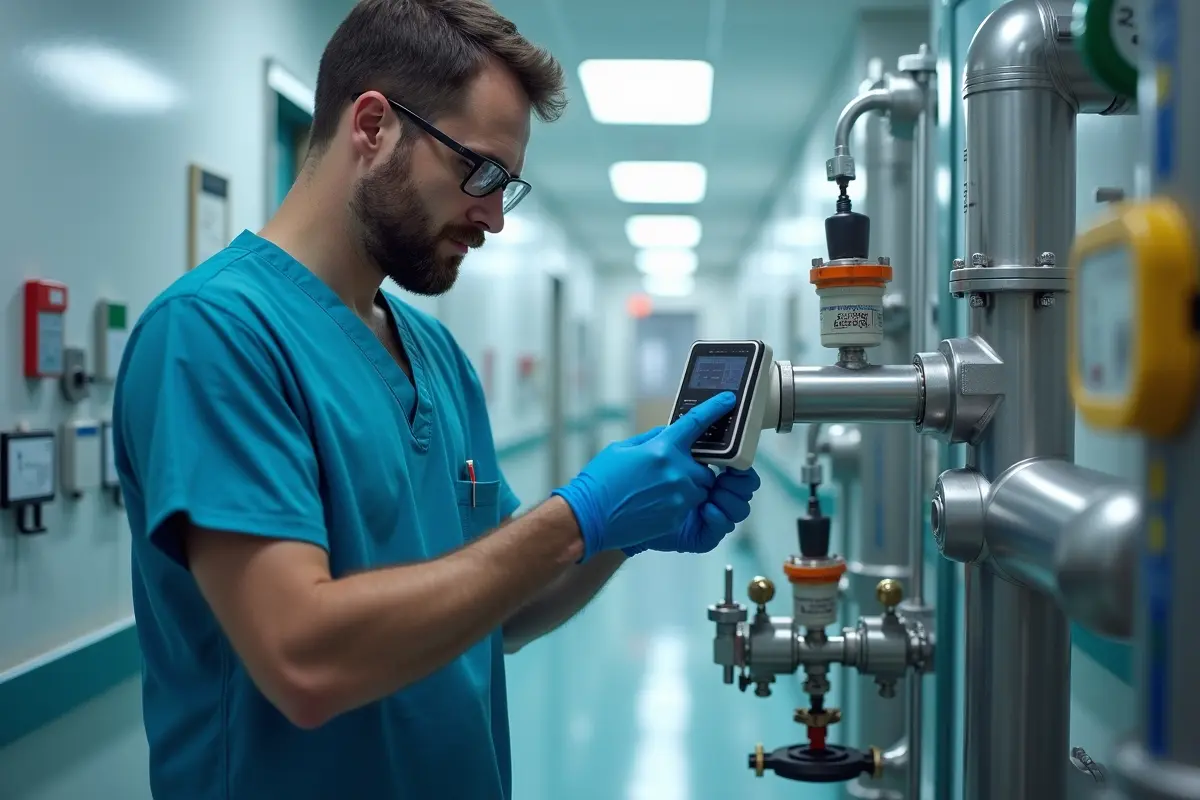When was the last time you thought about the medical gas system in your facility? It’s probably not a top-of-mind topic for most, but ensuring the reliability and safety of these systems is critical. Whether you’re running a hospital, dental office, or another healthcare facility, medical gases are central to patient care. Oxygen, nitrous oxide, and other gases aren’t just conveniences—they’re lifesaving essentials.
Now, imagine this: a malfunction in your system. It’s not just inconvenient; it could jeopardize lives. That’s why maintaining your medical gas systems isn’t just about compliance; it’s about ensuring every patient receives the care they deserve. But how do you keep these systems in check? Annual testing and inspections are the cornerstone of a safe and reliable system.
What’s Involved in Medical Gas Testing?
Medical gas testing might sound technical, but it’s straightforward when broken down. It’s all about ensuring that the gases being delivered are pure, the equipment is functioning as it should, and there are no leaks or hazards in the system.
Testing typically includes:
- Verifying gas purity – Ensuring the gas composition meets specific standards for medical use.
- Leak detection – Identifying any areas where gas might escape, which could pose serious risks.
- Pressure checks – Confirming the system maintains the appropriate pressure for optimal delivery.
- Alarm system evaluation – Ensuring alarms work correctly to alert staff of any issues.
- Inspecting connections and pipelines – Identifying wear, corrosion, or potential failures in the system.
This isn’t just a one-time activity. Regular testing ensures that even minor issues are caught and addressed before they escalate into major problems.
Why Annual Testing Matters
Annual testing is more than just a regulatory box to tick. It’s about ensuring patient safety, maintaining compliance, and protecting your facility from unexpected failures. Skipping these checks or delaying them can lead to serious consequences.
For example, a poorly maintained system could lead to contaminated gases reaching patients. The risks aren’t limited to patient health; they can also damage your facility’s reputation, trigger legal liabilities, and result in costly repairs.
And it’s not just about the worst-case scenario. Systems degrade over time—valves wear out, seals can crack, and even slight leaks can waste costly medical gases. Staying proactive helps you avoid these issues altogether.
Annual medical gas testing and inspection service providers are specialists in ensuring that all aspects of your system meet the required standards. Partnering with an experienced team ensures peace of mind, knowing your system has been thoroughly evaluated by professionals who understand the stakes.
What Are the Risks of Neglecting Your Medical Gas System?
When a medical gas system is neglected, the risks can quickly add up:
- Patient harm – Contaminated or improperly delivered gases can lead to medical complications.
- Operational downtime – A failed system can halt procedures, impacting patient care and revenue.
- Regulatory fines – Non-compliance with standards can result in significant financial penalties.
- Reputation damage – Failures can shake trust in your facility, which is hard to rebuild.
- Unexpected costs – Emergency repairs or system replacements are far more expensive than routine maintenance.
Addressing these risks isn’t just a matter of good practice; it’s an ethical responsibility.
What to Expect During an Inspection
When it’s time for an annual medical gas inspection, what happens? A qualified technician will conduct a thorough evaluation, checking each part of your system against stringent standards. Expect them to test gas quality, inspect pipeline integrity, and assess equipment like regulators and flow meters.
They’ll also examine your emergency backup systems, ensuring they’re ready if the primary system fails. Any deficiencies will be documented, along with recommendations for repairs or replacements.
If you’re working with an experienced provider, they’ll not only conduct the testing but also help you understand the results. That way, you can address any issues confidently, knowing your facility is up to code and safe for everyone.
Staying Compliant
Healthcare facilities are subject to strict regulations when it comes to medical gas systems. These rules exist for good reason: they protect patients, staff, and the public. Neglecting compliance isn’t just risky; it can also lead to fines, legal challenges, and even the suspension of operations.
By staying ahead of your inspections and scheduling annual testing, you can avoid these headaches. Plus, keeping your documentation up to date ensures that, when audits come around, you’re fully prepared.
How to Choose the Right Provider
Not all testing services are created equal. When selecting a provider, look for:
- Experience – Providers with a proven track record in healthcare environments.
- Certifications – Ensure they meet the standards for medical gas testing.
- Comprehensive services – From gas purity testing to pipeline inspections, they should cover it all.
- Clear communication – A provider who explains their findings and recommendations in plain language.
- Responsive support – Someone you can call on for guidance or emergency services if needed.
Taking the time to find the right partner will make a world of difference in maintaining your system.
Ready to Prioritize Safety?
When it comes to medical gas systems, there’s no room for shortcuts. Annual testing might feel like another item on a long to-do list, but it’s one of the most impactful steps you can take to protect your facility, your staff, and, most importantly, your patients.
Think of it this way: would you rather deal with a minor repair during scheduled maintenance or face a full system failure during a critical moment? Staying proactive ensures that your facility continues to operate smoothly, giving everyone peace of mind.
Take action today. Schedule your next inspection, ensure your systems are compliant, and rest easy knowing you’ve done everything possible to safeguard the people who depend on your care.




